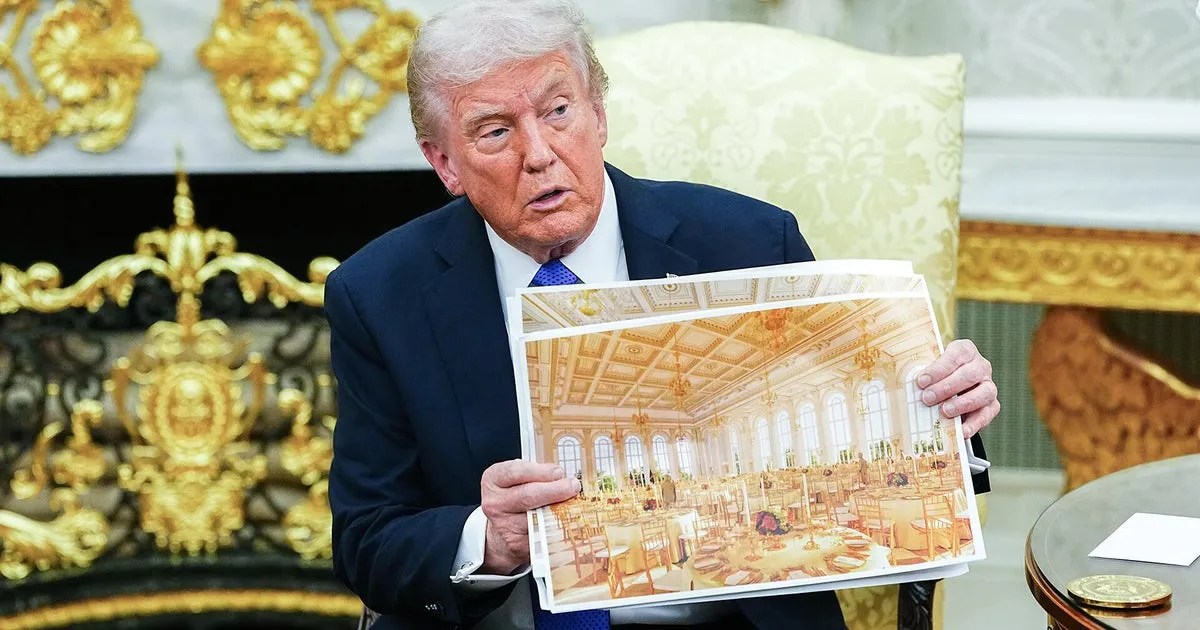
Dozens of executives and companies have come together to fund the construction of President Trump's ambitious $300 million ballroom, which is set to replace the White House's East Wing. Many of these donors are closely watching for favorable policies, reduced scrutiny, or expedited approvals for major deals from the White House. The list of contributors includes prominent Big Tech firms, defense contractors, and other large corporations. While the White House has not disclosed the specific amounts donated by each company, it has confirmed that the construction will be financed through private donations and Trump's personal funds, rather than taxpayer money.
CBS News has reviewed a list of 37 donors provided by the White House, revealing significant contributions from tech giants like Google and Amazon, as well as cryptocurrency firms such as Ripple and Coinbase. Other notable contributors include Nvidia, Susquehanna International Group, and ExtremityCare, according to sources familiar with the fundraising efforts. Recently, President Trump hosted a dinner to thank these donors, although not all invited contributed to the project.
When questioned about potential conflicts arising from these donations, White House Press Secretary Karoline Leavitt emphasized that critics who accuse the administration of conflicts of interest would likely complain if taxpayers were funding the project. "The donors for the White House ballroom project represent a wide array of great American companies and generous individuals, all contributing to make the People's House better for generations to come," she stated.
As the ballroom project progresses, it is important to closely examine the interests of some of the contributors and the potential benefits they may derive from federal policies.
Among the key contributors are major tech companies such as Google, Palantir, Amazon, Microsoft, and telecommunications giant T-Mobile. Notably, YouTube, owned by Google, agreed to contribute $22 million toward the ballroom as part of a legal settlement stemming from a case initiated by Trump after the 2021 Capitol riot.
Palantir has secured over $800 million in government contracts in fiscal year 2025 — a record high — and has become integral in managing data across federal agencies. Amazon and Microsoft have also benefited from hundreds of millions in government contracts, as confirmed by federal data.
T-Mobile's involvement raises eyebrows due to its connection to a mobile service company linked to the Trump Organization, which has prompted concerns from House Democrats regarding potential conflicts of interest. A T-Mobile spokesperson clarified that while the company donated to the Trust for the National Mall, it has no influence over the use of these funds or the ballroom's construction decisions.
Among the dinner guests was Nvidia, a leading microchip developer. The Trump administration has granted Nvidia export licenses to send select chips to China, and the company is currently awaiting approval to export AI chips to the United Arab Emirates. Nvidia's CEO has been advocating for greater access to the Chinese market, indicating a strong interest in benefiting from the administration's policies.
Another notable guest was Jeff Yass, co-founder of Susquehanna International Group, who has invested heavily in TikTok. Despite Trump's initial attempts to ban the platform, he has recently signed an order allowing TikTok to operate in the U.S. with American investors.
Several prominent names in cryptocurrency have also made donations, reflecting the Trump administration's push to position the U.S. as a global crypto hub. Coinbase, the largest U.S. cryptocurrency exchange, confirmed its contribution to the ballroom project as it seeks SEC approval for blockchain-based stocks. The company is currently under investigation by the SEC regarding its past financial disclosures.
The Winklevoss twins, owners of crypto exchange Gemini, also contributed to the project. In a recent development, the SEC closed an investigation into their exchange shortly after they donated over $2 million to MAGA Inc. Furthermore, Ripple's CEO has publicly expressed support for the administration's cryptocurrency policies, with Trump promoting Ripple's coin, XRP, as part of a proposed U.S. government-controlled crypto reserve.
In the defense sector, Lockheed Martin reportedly donated over $10 million to the ballroom project. Traditionally, the defense contractor has secured tens of billions annually in federal contracts. Another contributor, Booz Allen Hamilton, generates a significant portion of its revenue from government contracts, although it has recently faced challenges due to spending cuts under the Trump administration.
Media giant Comcast has expressed interest in acquiring Warner Bros. Discovery, but such a merger faces considerable federal scrutiny. Historical tensions between Comcast and the Trump administration add another layer of complexity to its involvement.
In the medical industry, ExtremityCare made its presence known as a donor, with its CEOs attending the thank-you dinner. The company previously donated $5 million to MAGA Inc., and shortly after, the Trump administration moved to delay a Biden administration plan that would limit Medicare coverage for its products.
The construction of President Trump's ballroom is not just a project funded by private donations; it highlights the intricate relationships between donors and the potential benefits they may receive from federal policies. As the project progresses, it will be crucial to monitor how these connections impact future legislation and administration actions.
For further insights and updates on this developing story, stay tuned to CBS News and other reputable news sources.